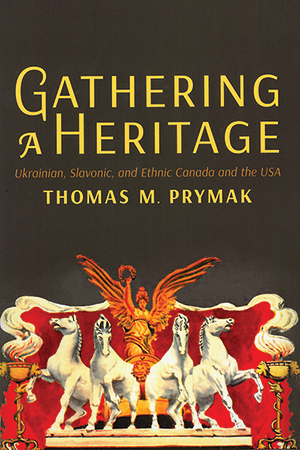by Jim Mochoruk,
Department of History, University of North Dakota
|
Thomas M. Prymak, Gathering a Heritage: Ukrainian, Slavonic, and Ethnic Canada and the USA, Toronto: University of Toronto Press, 2015, 364 pages. ISBN 978-1-4426-1438-3, $29.95 (paperback)
 Thomas Prymak has spent a long and fruitful career studying Ukrainians in both the North American diaspora and in Europe and this collection of his essays reflects several of the most important trends that he has either observed or participated in over the course of a remarkable career. Spanning the period from the early 1980s until the early 2010s Prymak has chosen and curated a set of his own essays, and, in a couple of cases, has offered wholly new pieces or has expanded, updated, and made older essays available to a North American audience for the first time.
Thomas Prymak has spent a long and fruitful career studying Ukrainians in both the North American diaspora and in Europe and this collection of his essays reflects several of the most important trends that he has either observed or participated in over the course of a remarkable career. Spanning the period from the early 1980s until the early 2010s Prymak has chosen and curated a set of his own essays, and, in a couple of cases, has offered wholly new pieces or has expanded, updated, and made older essays available to a North American audience for the first time.
It needs to be observed that in many ways these pieces are more about the state of Ukrainian, Ukrainian Canadian, and Slavonic studies than they are about Prymak’s own scholarly contributions to the field – thus his major monographs on Mykhailo Hrushevsky, Mykola Kostomarov and on Ukrainian Canadians during World War II are barely mentioned, save in footnotes and in the chapter (13) on the state of scholarship related to Hrushevsky in the early 1980s. Rather, readers will find themselves immersed in a detailed set of analyses, which traverse the historiographic and bibliographic ground of Ukrainian history, eastern European emigration history and the development of both Slavonic and Ukrainian Canadian Studies.
Naturally enough, some of these essays are themselves artifacts of an earlier period and feel a bit dated. Two of the essays in the book’s first section – the essay on a somewhat obscure late-Soviet period book on emigration from Imperial Russia between 1880 and 1914 and the one dealing with Anna Reczy?ska’s work om emigration from the Republic of Poland during the interwar period - fall into this category. However, Prymak’s revisiting of an early 1980s article he wrote on Ivan Franko and economic emigration from Galicia, and his never-before published piece on Gabrielle Roy’s “Stephen” are anything but dated and will be much appreciated by most readers. And it is safe to say that the entire second section of the collection, entitled “History, Historians, and Others” should become required reading for those who seek to understand the development of Ukrainian studies in Canada and the somewhat tortuous path that led to the field’s academic respectability. Still, for all the excellence of the essays in this section and for what they tell us about the contributions of scholars such as Doroshenko, George Simpson, Lubomyr Wynar and a host of others, it is “In the Shadow of Assassination: Gabrielle Roy’s ‘Stephen’ and the Ukrainian Canadians” that most readers will find most compelling. It is here that one gets the most complicated picture of Ukrainian politics (both in North America and Europe), Ukrainian cultural attainments, and the growing acceptance of Ukrainians in the host society – all tied into the fascinating autobiography of one of Canada’s finest writers.
The penultimate section of this collection, on “Library Studies and Reference Works,” seems a bit daunting at first glance, but readers are rewarded with a number of gems. There is a sparkling essay on the contributions and travels of Jaroslav Rudynyckyj – the most celebrated of Canada’s emigre scholars of the DP generation, plus a wonderfully reflective piece on the scholarship related to Mykhailo Hrushevsky in the early 1980s (this is clearly Prymak’s most intensely personal essay in this collection, save for the preface and introduction). And finally there is a most useful essay on the portrayal of Ukrainian Canadians in encyclopedias. Although this essay has seen only the most limited of circulation since it was written in 2010, it does a wonderful job of filling in the one notable gap in Francis Swyripa’s outstanding 1978 survey of the portrayal of Ukrainians in English Canadian literature. Finally, Prymak rounds out his collection with some wide-ranging ruminations which compare the experience of Ukrainians in Canada and the United States — an essay which offers some telling insights into the differences and similarities of the two sets of experiences, and which also raises some difficult questions about the fate of group identities in the brave new world of the 21st century.
Overall, while there are clearly some parts of the Ukrainian “heritage” which have not been fully gathered in this collection (simply because Prymack’s work did not focus upon groups such as the Ukrainian-speaking protestants, women, interactions between the various church and secular groups, the Ukrainian Canadian left, etc.), Prymak has done all scholars of ethnicity in Canada a favour by bringing these essays together. Indeed, as alluded to above, this collection will be a highly useful addition to the library of any scholar or student who is seeking to understand the often complex historiography of Ukrainian and Slavic studies.
We thank Clara Bachmann for assistance in preparing the online version of this article.
We thank S. Goldsborough for assistance in preparing the online version of this article.
Page revised: 12 August 2020